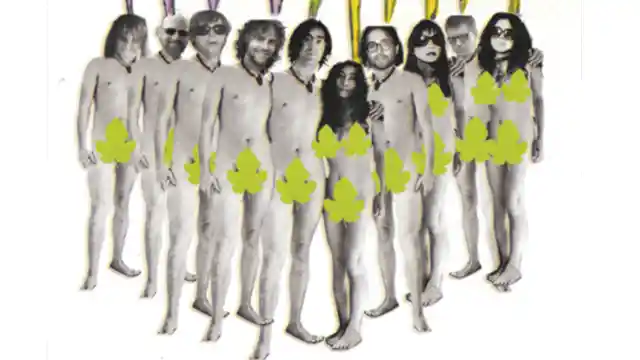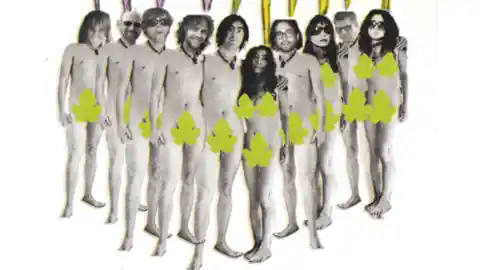

What constitutes a supergroup as defined by Dexter is a rock band whose members have been in prominent bands prior to the formation of the supergroup. With that said, here are my picks for the best supergroups of all time.
Number Ten: Broken Bells. When you bring together Brian Burton aka Danger Mouse and James Mercer of the Shins, you are bound to get something special. Broken Bells formed as a side project for both artists in 2009 and released their self-titled debut the following year. Reviews were positive and fans from the Shins’ camp were delighted. The disc peaked at number 7 on Billboard Top 200.
While the disc had a Shins vibe, it did include a unique sound with contemporary synthesizers and a ’70s vibe, which was heavily reminiscent of the Bee Gees. The duo continued to experiment on their second record After the Disco. Songwriting for the new disc had a deeply personal feel on such tracks as “Holding on for Life” and “Leave it Alone.” They have seen their little side project grow in popularity, so much so, it appears that Broken Bells is now competing with the Shins and Danger Mouse.
Number Nine: Electronic. Johnny Marr has been the go-to guitarist for many bands since the Smiths ended, beginning with a brief stint as a member of the Pretenders, releasing a killer album, Boomslang, with the Healers, and session work with the likes of Black Grape, Pet Shop Boys, Bryan Ferry, Beck and Talking Heads. His most ambitious project came in 1988 when he teamed up with New Order’s Bernard Sumner to form the supergroup, Electronic.
From 1991 to 2010, the band has only released four discs, beginning with their self-titled debut which went to number 2 in the UK. Unlike his previous work, Electronic was more geared towards the New Order camp as the duo went synth-heavy, though the Smiths influence was felt on “Tighten Up.” The duo enlisted help from Pet Shop Boys’ Neil Tennant to handle lead vocals on “Getting Away With It.” While the album was praised in the UK, it didn’t fair well in the States. Despite critical acclaim, the band’s next two albums didn’t fair as well, but for fair weather fans, they released a “greatest hits” compilation in 2010 entitled Get the Message.
Number Eight: The Raconteurs. These days, it seems everything Jack White touches turns to gold. While with the White Stripes, he formed the Raconteurs, which gives White another creative outlet – further creative releases come with the Dead Weather. White is joined by a couple of Greenhorns members, which gives the band their “supergroup” status. Unlike the Stripes, the Raconteurs produced great little three-minute pop tunes. Musically, the band borrows from 1960s pop rock.
Best known for the tune “Steady as She Goes,” supporters of the band know that’s just scratching the surface as they can get loud and raunchy. With White at the helm, it always comes back to basics, and the Raconteurs are steeped heavy in the blues, but it comes masked in a wash of heavy guitar riffs, crashing drums and tons of feedback.
Number Seven: Them Crooked Vultures. Dave Grohl has put his former bandmate’s suicide behind him. As frontman for the Foo Fighters, he has transitioned from drummer to the spotlight with ease. But his side project is equally as impressive. Them Crooked Vultures features ex Led Zeppelin bassist John Paul Jones, and Josh Homme of Queens of the Stone Age. With such an impressive line up, expectations were high, and the band delivered with their self-titled debut which ranked at number 12 on Billboard and went on to win a Grammy.
The first thing you might notice is they pay respect to classic rock while maintaining their edge for the alternative audience. The second thing is, Grohl is back on drums forgoing the spotlight this time around as lead vocals are handled by Homme. The popularity of the band has led to questions about the possibility of a new album, but so far, nothing is set in stone.
Number Six: Crosby, Stills, Nash and Young. Let’s focus on CSN for now. Crosby, Stills and Nash have been making beautiful music for decades. With lush harmonies, the band’s second show was at Woodstock. Banking on the success of other supergroups such as Blind Faith, the band delivered a classic. Crosby, Stills and Nash was rełeased in 1969 to rave reviews and tracks such as “Wooden Ships,” “Marrakesh Express” and Suite: Judy Blue Eyes have become a staple on classic rock radio.
Upping the ante, they added former Buffalo Springfield member Neil Young to the mix on their sophomore release Déjà Vu, which spawned “Teach Your Children,” “Our House” and “Woodstock.” It would also be the first time we heard Young test his pipes on “Helpless.” The band scaled back to a trio for CSN, which housed the track “Just A Song Before I Go,” which held the number two spot. They had a couple of hits in the ’80s, but were unable to return their heydays.
Number Five: Velvet Revolver. Locked and loaded, Velvet Revolver burst onto the rock ‘n roll scene in 2004 with a bang. The band featured Slash, Duff McKagan, and Matt Sorrum (all from GNR) along with punk rocker Dave Kushner and Scott Weiland from STP. Their debut, Contraband, flew off the shelves in 2004 as it met with all the hype that surrounded the supergroup.
Capitalizing on the song ‘”Slither,” the band took home a Grammy. The record would go on to achieve platinum status. The band’s second release, Libertad was another monster success as fans just couldn’t get enough. While the album wasn’t as strong as the debut, it gave us a shot in the arm with tracks like, “Get Out the Door” and “Let it Roll.” With a Weiland departure in 2008, the band left the spotlight for other projects.
Number Four: Audioslave. Audioslave followed the heyday of grunge and found Chris Cornell in a more mature band. With Rage Against the Machines’ Tom Morello on lead guitar, the band created a new sound as the two veterans took the world by storm. The band was a success because they cleverly fused classic rock with an alternative backdrop.
The band’s debut, Audioslave, was released in 2002 and entered the charts at number 7 and would be certified Gold within a month. Longtime Soundgarden fans were waiting for Cornell’s voice to show up on something like this. The band’s second release, Out of Exile, was met with similar praise charting at the top. Cornell was writing deeper and more personal songs, and it was noticed that his vocals were stronger than previous releases with both Soundgarden and Audioslave.
The band had one more album in them. Revelations was released in 2006, and unlike previous records, the band flirted with R&B and 70s funk. Moreover, the band got political for the first time. While they officially disbanded in 2007, they left us with three great albums to revisit.
Number Three: Zwan. If you can’t stand Billy Corgan, it’s probably best if you skip this one. After the Pumpkins split, Corgan along with drummer Jimmy Chamberlin teamed up with Matt Sweeney (Skunk), to create Zwan. The band’s one and only release, Mary Star of the Sea, was not a one dimensional record as it featured Christian overtones on songs such as “Lyric” and “Honestly,” which penetrated deeply into the soul of humanity.
The band had the ability to transcend space and time creating a hypnotic mood, but they could still rock with the best of them, and tunes such as “Yeah!” and “Baby Lets Rock” proved it. Perhaps one of the greatest albums recorded in the twenty first century.
Number Two: Cream. Eric Clapton was already a seasoned guitar player before he formed Cream. Ginger Baker was too established as the drummer lead the band The Graham Bond Organisation. Jack Bruce was also a featured member of Graham Bond’s lineup. Put the three veterans together, and you had yourself the first supergroup.
The band were heavyweights when it came to the blues and did some traditional numbers such as “Crossroads” and “Born Under a Bad Sign,” but also did some psychedelic rock such as “I Feel Free,” “White Room” and “Sunshine of Your Love.” Writing duties were credited to lyricist Pete Brown, who had the knack for writing trippy acid rock anthems.
While the band’s biggest selling and only double album to be certified platinum, Wheels of Fire, there was trouble within the band. While the didn’t want to record another album as Cream, they were persuaded to and issued Goodbye in 1969. While Clapton’s career flourished, Baker and Bruce weren’t as lucky. I saw a Ginger Baker interview, and he was still pissed off at Bruce and seemed a bit bitter.
Number One: The Plastic Ono Band. Lennon was already doing solo stuff by 1968 with his new wife, Yoko Ono. The pair put together a couple of groundbreaking albums, Two Virgins and Life With the Lions – though they were panned at the time, and their influence wouldn’t be felt for years after – as Lennon was growing tired of the Beatles. The band was a conceptual endeavor with a host of musicians contributions, namely Eric Clapton (guitar) Klaus Voormann (bass) and Alan White (drums).
The newly formed band were featured guests at the Toronto Rock and Roll Revival as the performance acted as the band’s debut, Live Piece in Toronto. Once in the studio, everybody was on board with the exception of Clapton, but Lennon had plenty of musicians to pick from. With the addition of George Harrison, Billy Preston and Phil Spector, they released their first single, “Instant Karma!” in 1970. Though the single would need to compete with the Beatles’ Let it Be, it sold over a million copies and charted fairly well in both the States and the UK.
After the Beatles split up, an album followed entitled John Lennon/Plastic Ono Band, on which Ringo Starr replaced White. The record has been said to be the finest post-Beatles album, and Lennon’s finest work as it featured such tracks as “God” and “Mother.” It would prove to be Lennon’s last album with the official recording as the Plastic Ono Band. The future would find members coming and going until the untimely death of John Lennon.